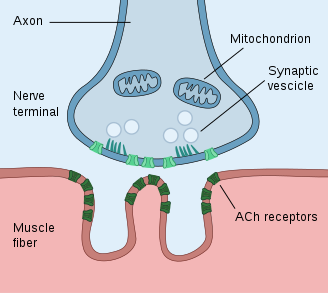Myasthenia Gravis is a muscle condition which can affect any of the muscles of the body, and particularly has a predilection for eye muscles. So patients with myasthenia are often diagnosed in my neuro-ophthalmology clinic.
Muscles are controlled by nerves. The nerves come right up next to the muscle and send a chemical signal called acetylcholine to tell the muscles when to tighten. This is a neuromuscular junction:
Myasthenia is a form of autoimmune disease. Normally the body makes antibodies to fend off infections like bacteria and viruses. However, in auto-immune diseases the antibodies that are made end up attacking our own tissue. In the case of myasthenia, the problem occurs in the neuromuscular junction. The antibodies get in there and clog up the junction, blocking the chemical signals. Without the proper signaling the muscle gets weak.
Any of the muscles in the body can be affected by myasthenia, but the eyes are very common. No one knows exactly why. Eye muscles are unique. They are not designed to be super strong muscles, but they are very quick muscles. Maybe that unique feature makes eye muscles more susceptible to myasthenia.
Besides eye symptoms, watch out for weakness of speech, swallowing or breathing. Also consider weakness of the body, the arms, the legs or the neck. Sometimes patients just have a generalized fatigue type symptom.
The main eye or vision symptoms are droopy eyelids and double vision.
The most common story that I hear is double vision begins while driving at night.
Myasthenia turns this:
Into this:
There are two classic features of myasthenia: variability and fatigability.
Oftentimes that is the clue that makes the diagnosis. Sometimes the eyes go one way, sometimes they go another. Sometimes the left eyelid droops, sometimes the right, or both. There are not a lot of conditions that vary so much. The fatigability is also a classic feature. In fact, we will often do a sort of stress test in the office and ask the patient to stare up for 90 seconds to see how much the eyes or eyelids tucker out. The best way to ask about fatigability is compare symptoms first thing in the morning and late in the evening. Every neurologic condition gets worse when we are tired, but the difference in myasthenia can be profound.
There are a couple of important things that everyone with myasthenia should know.
First is myasthenic crisis. Myasthenia can effect any of the muscles in the body. If a patient develops trouble with their vital functions such as breathing and swallowing, they should get evaluated in a medical center right away. We can take care of those problems, but don't wait and see how it goes and get into trouble.
The other thing to know is that many new medications can trigger an exacerbation of myasthenia, especially antibiotics. If patients need to start a new medication, then they should double check a list of meds to avoid or meds to be careful with. These lists are available on websites such as myasthenia.org or myaware.org. I usually check on UpToDate.
Myasthenia patients should usually get a scan of their chest. Rarely, myasthenia is caused by a tumor of the thymus - a thymoma. I haven't ever seen a case, but it could happen, so it is worth checking.
The next thing to consider will be treatment.
There are two categories of treatment: symptomatic management like Mestinon or immune suppressive therapy such as prednisone or CellCept.
The first option is Mestinon. It is just symptom treatment. The disease blocks those chemical signals; acetylcholine, so Mestinon give the chemical a boost. And this might be enough to treat your symptoms. Unfortunately, it will boost all your muscles, and no it won't give you super strength,
it can make your muscles twitchy and crampy- and that includes your GI muscles so watch out for this medicine, it can cause stomach cramps and diarrhea.
The other option is to treat the immune system. That is the underlying problem, after all. Steroids like prednisone are usually effective, but unless you can get down to a low dose, steroids will cause a host of side effects. Other immune suppression like CellCept can be considered, but expect that to work more slowly.
In summary:
Myasthenia Gravis is an autoimmune neuromuscular condition.
It can affect the body in many ways but really favors the eye, causing droopy lids and double vision.
Patients should understand about myasthenic crisis and avoiding certain medications and screening for thymus tumor
Treatment can be done with symptomatic therapy or immune suppressive therapies.





